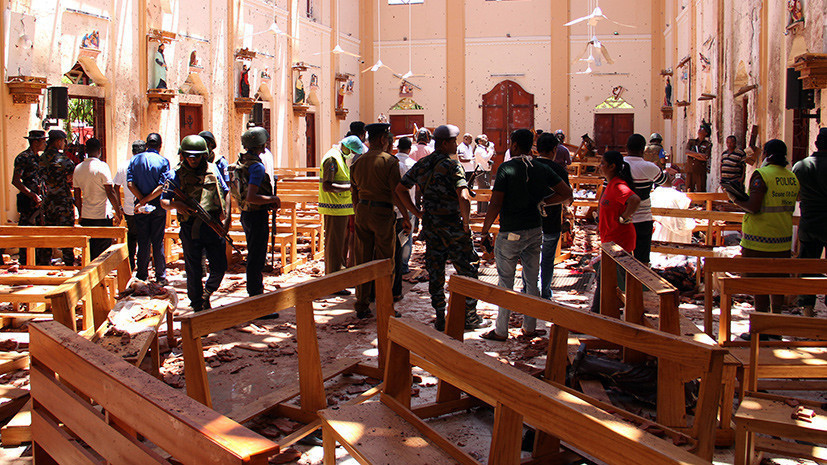As a result of a series of terrorist attacks in Sri Lanka, according to the latest data, 290 people were killed, more than 500 were injured. This information is provided by the AP with reference to a police statement released on the night of April 22.
On Sunday, a series of explosions took place in the country, with six of them almost at the same time in three five-star hotels, in the church in Colombo and in two temples in the suburb of the capital Negombo during the celebration of Catholic Easter. On the same day, two more explosions occurred, one of which led to victims among the visitors to the zoo in the area of Dehiwala. During the eighth explosion, three policemen died, NDTV reported. It is also known that law enforcement authorities discovered and defused an explosive device near the Bandaranaike International Airport.
- © LAKRUWAN WANNIARACHCHI / AFP
The victims of the terrorist attacks were at least 35 foreign nationals. According to the news portal News 1ST, citing a representative of the National Hospital in Colombo, among the dead are citizens of the United States, Denmark, China, Japan, Pakistan, Morocco, India, Bangladesh. It was also noted that among the victims may be citizens of Portugal and Turkey, the identification of bodies continues. According to Sky News, the explosions claimed the lives of five British subjects.
- AFP
According to the preliminary version of the investigation, the radical Islamist groups could be the organizers and perpetrators of the terrorist attacks. Presumably, the suicide attacks have been carried out, but the local police have so far confirmed this information only in relation to one explosion.
Law enforcement agencies managed to detain 13 people suspected of involvement in the attacks.
The authorities of Sri Lanka have announced a curfew, school holidays have been extended for two days, security measures have been tightened at the island’s airport.
Meanwhile, the Archbishop of Colombo, Cardinal Malcolm Ranjit, called on the country's leadership to bring to justice those involved in the terrorist attacks.
“I would like to ask the government to begin an impartial and effective investigation and find out who is behind this attack, and also punish them mercilessly, because only animals could do this,” the Ada Derana portal quoted him as saying.
According to Reuters, head of the country's cabinet of ministers Ranil Vikramasinghe convened an emergency meeting of the security council.
"We have already encountered this before"
Commenting on the circumstances of the tragedy, the Ambassador of Sri Lanka to Russia, Dayan Jayatyllek, said that the attack was not so much tourists as the Christian community celebrating Easter. Otherwise, the beaches would be attacked first, the diplomat said.
“This is a terrorist act. We have already encountered this before. But we thought it was in the past, after we finished off terrorism exactly ten years ago, in May, but it comes back, it is terrorism, and we again face it, ”RIA Novosti cites Dzhayatillek.
- Archival photo. Militants of the Tamil Elam Liberation Tigers.
- Reuters
According to AFP, local security officials could be aware that terrorists are planning terrorist attacks in churches.
“The paper, which allegedly entered the police, says that an attack is planned on several Christian churches,” explained military expert Boris Rozhin. “Perhaps the special services did not take the information seriously or the security measures that were taken were insufficient.”
The authorities have not yet announced the official version of what happened, however, according to the media, radical Islamists may be involved in the bombings. In particular, in the Western media they compare the attacks with those that were committed in the past in Sri Lanka - the Tigers of the Liberation of Tamil Eelam group was involved in them. This organization is recognized as terrorist in India, USA, UK, EU, Canada and Australia.
The Tigers of Tamil Eelam Liberation Movement originated in the late 1970s, and its goal was to fight ethnic Tamils inhabiting the northern regions of the country (at that time they constituted 22% of the population) with singalas representing the majority - about 70% of the population. In 1983, the Tigers of Tamil Eelam's Liberation Tigers began an armed conflict with government forces. Inter-confessional has also been imposed on ethnic strife, since the majority of Sinhalese profess Buddhism, and the Tamils - Hinduism and Islam. The war between government forces and the "tigers" lasted about thirty years - until 2009.
To gallery page
"Tigers" actively resorted to terrorist methods of fighting. The government and the separatists concluded a truce only in the early 2000s. Nevertheless, the "tigers" continued to build strength. In 2008, the authorities announced the termination of the truce and launched an offensive, which ended with the rout of the group the following year.
According to some Indian media reports, IG militants * who fled after the defeat in the Middle East may be involved in terrorist attacks. to the countries of Southeast and South Asia.
However, before the announcement of the official results of the investigation, it is too early to talk about specific perpetrators and organizers of terrorist acts, analysts emphasize.
* “Islamic State” (IG, ISIL) - the organization is recognized as terrorist by the decision of the Supreme Court of the Russian Federation dated December 29, 2014.

